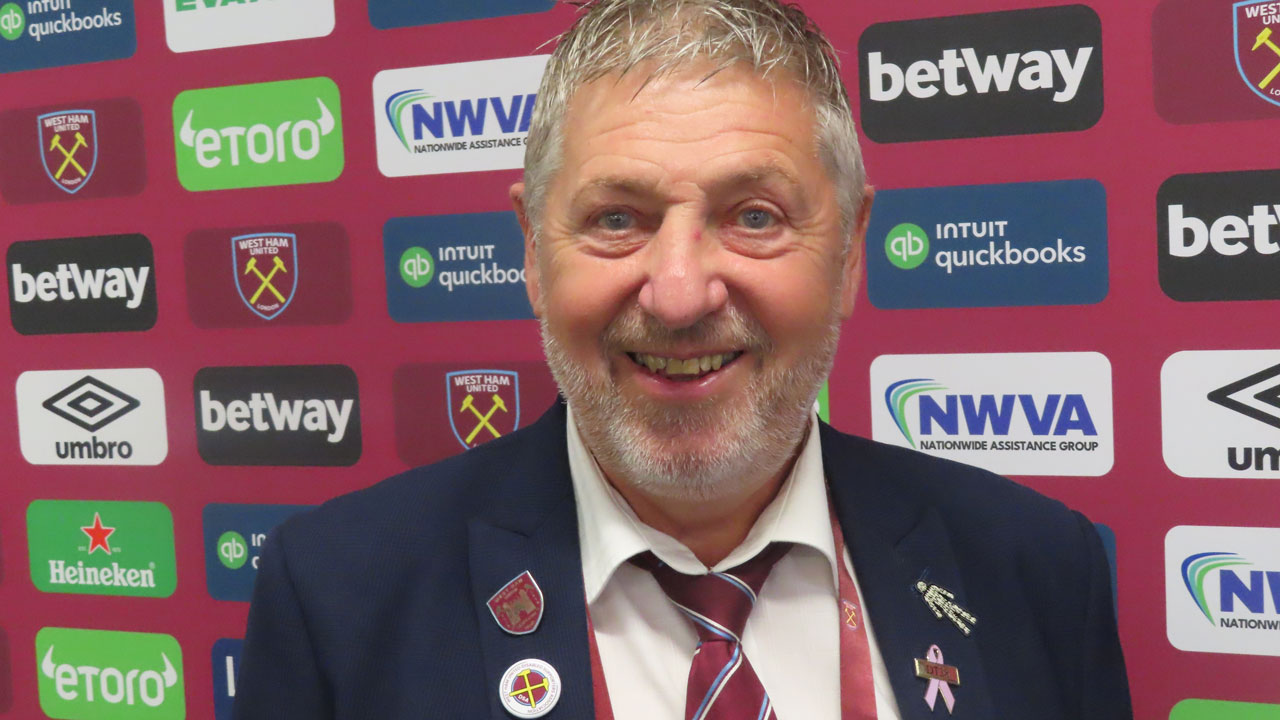West Ham United legend Geoff Pike won many a battle during his time on the pitch, and now he is up for another one after being diagnosed with Parkinson’s disease.
Parkinson’s disease is a condition in which parts of the brain become progressively damaged over many years, causing a range of symptoms that can include involuntary shaking of particular parts of the body, known as a tremor, slow movement, stiff and inflexible muscles, balance problems and mental health issues. Around 153,000 people live with Parkinson’s in the UK and it is the fastest growing neurological condition in the world.
The 68-year-old revealed he has the condition in an interview with friend, former Hammers News writer and Official Programme columnist Steve Blowers in the issue published for the Premier League fixture with Ipswich Town played on 5 October. In it, Pike also reveals he could have joined the Tractor Boys as a teenager, had it not been for the late, great then-Academy coach John Lyall.
In the interview, typical of his team-first attitude and modesty, former midfielder Pike spoke glowingly of his respect for former West Ham and Ipswich manager Lyall, who oversaw his Hammers career and later encouraged him to take up the roles he served with the Professional Footballers Association and Football Association when his playing career ended in the mid-1990s.
Nearly 30 years on – and nearly 20 on from Lyall’s untimely death in 2006 – Pike continues to work as a coaching consultant all over the world, and has vowed to continue working as he learns to live with Parkinson’s.
Here is the 1980 FA Cup winner’s interview in full…
It is almost 50 years since John Lyall’s first-team squad were marching down Wembley Way towards their FA Cup final clash with Fulham.
And half-a-century ago, a bright band of Hammers youngsters were also en route to a major showdown of their very own – a 1975 FA Youth Cup final meeting with Ipswich Town.
Having already been at Upton Park for some nine years, Geoff Pike was one of West Ham United’s most promising prospects and, indeed, the fresh-faced, Clapton-born midfielder would go on to make 368 senior appearances in the Claret and Blue across a dozen seasons.
Yet, ironically, he could so easily have ended up ploughing a different furrow with the Tractor Boys.
“Aged nine, technically, I’d been a few months too young to train with West Ham but somehow had got caught up with the next year group,” explains Geoff. “Although Youth Team coach John Lyall realised that early on, he’d still let me join in with the older kids and I’d thoroughly enjoyed myself.
“John called me over at the end of that first session and I’d feared the worst but he just smiled: ‘Make sure you come back here next Thursday, son!’ From that moment on, John would have a massive influence on me.
“He became my ‘football dad’ and had a pronounced affect both on my career and my life… from youth team to first team and even into retirement.
“Once I’d finished playing, I’d started working for the Professional Footballers’ Association and with John now at Ipswich, I popped in to see him at home in Suffolk.
“He’d just climbed off his tractor having mowed the grass and, over a cup of tea said: ‘Geoff, someone like you should work for the Football Association.’ That became a big target and, three interviews later, I got a job at the FA. I’m still a freelance Football Education Coach and Mentor to this day and that’s testimony to John’s legacy.
“As a kid, I progressed through the age groups but prior to formally signing for West Ham, found myself invited to Ipswich for a trial. They put me into bed and breakfast accommodation and, having trained all week, I ended up at Portman Road playing in a Friday game against their youth team.
“Afterwards, Ipswich’s manager, Bobby Robson asked: ‘What are you doing about a club?’ I told him I hoped to join West Ham. ‘Well, I want you to sign for me,’ he said. ‘You’ll be in our first-team within two years.’ The Hammers were still my first choice but that sounded very tempting.
“Once I’d got home, Bobby phoned three times within a week to find out what was happening. West Ham were dragging their heels over a contract so I spoke to Chief Scout, Wally St. Pier and told him about Bobby’s calls. Within five minutes, I was signing apprentice forms for West Ham United!”
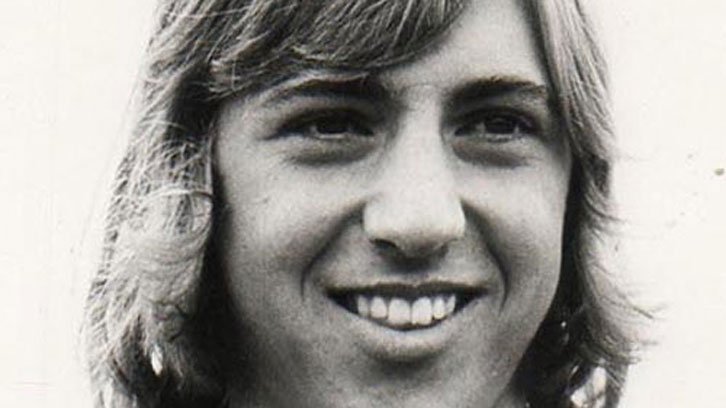
Lyall's volley of praise
Notwithstanding he was now in charge of first-team affairs, Lyall still kept a close eye on protégé Pike.
“One afternoon, I was at Upton Park tidying up with the Youth Team, when John told us to change into our kits,” reveals Geoff. “He gathered us under the West Stand, gave everyone a ball and asked us to keep passing it back to ourselves off the wall. We started with two-touch, then one-touch but it got a bit monotonous so Paul Brush, Alan Curbishley and myself started clipping the ball higher up the wall and hitting it back on the volley.
“John could’ve got the right hump with us for deviating from his drill but I think he liked players to show confidence and try things without fear.
“Out of everyone there, only the three of us went on to play for the first-team and while that obviously wasn’t just because we were doing those volleys, it underlined John’s talent for seeing things in young players.
“Although John had moved up, our youth team coaches remained the epitome of how West Ham United was run. Bill Lansdowne and Ronnie Boyce came from the same mould as John and Ron Greenwood – there was no shouting and no hollering, instead they just encouraged, mentored and gave players total support.
“When it came to the 1975 FA Youth Cup, it was our equivalent of the FA Cup and an opportunity to represent the Club we loved in the most prestigious competition there was for our age.”
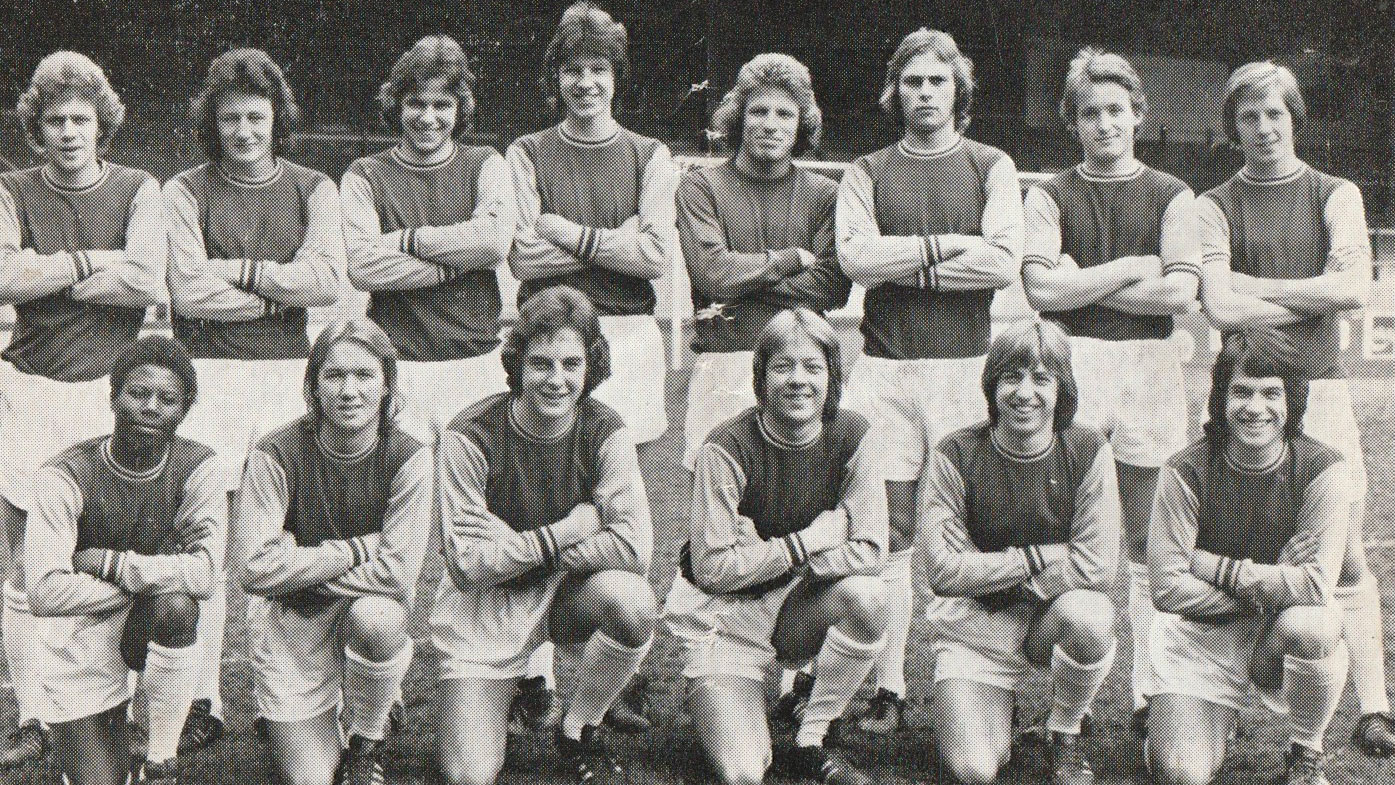
The big fish!
Top-scorer Pike would become the Club’s big fish in the tournament, netting four goals as the young Hammers overcame the likes of Chelsea and Liverpool on their way to the final.
Fittingly, Geoff scored in the opening game, a second round London derby at The Valley, where hosts Charlton Athletic were defeated 3-1.
That set up a home tie against Watford (2-0) before Liverpool became the next visitors to the Boleyn Ground, where Pike’s header sent West Ham on the way to another 2-0 victory over the Reds.
A last-eight tie against Chelsea then ended all-square at 2-2 in front of 4,141 spectators and that meant a replay at Stamford Bridge, where Geoff was again on target as the Hammers won 2-1.
In the semi-finals, Middlesbrough had brought their slim one-goal advantage into the return at the Boleyn Ground, where Malcolm Hill’s opener drew West Ham level on aggregate before a Pike strike secured a 2-0 victory on the night to send the Hammers into another two-legged affair against… Ipswich.
“I’m told there were 10,227 at Upton Park for the first-leg of the final (1-3), whereas we’d only usually see 200 people standing on the touchline at Chadwell Heath on a Saturday morning. As well as the Boleyn Ground, we’d been given chance to play at iconic stadiums such as The Valley, Stamford Bridge, Ayresome Park and Portman Road, where 16,247 turned up for the second-leg (0-2) of the final.
“It’d also been a great incentive to know the first team were progressing so well in the FA Cup and that really motivated us. They’d train on the next pitch and, from a young age, we’d constantly be looking over our shoulders hoping that Ron or John would invite us to step across and play with them.
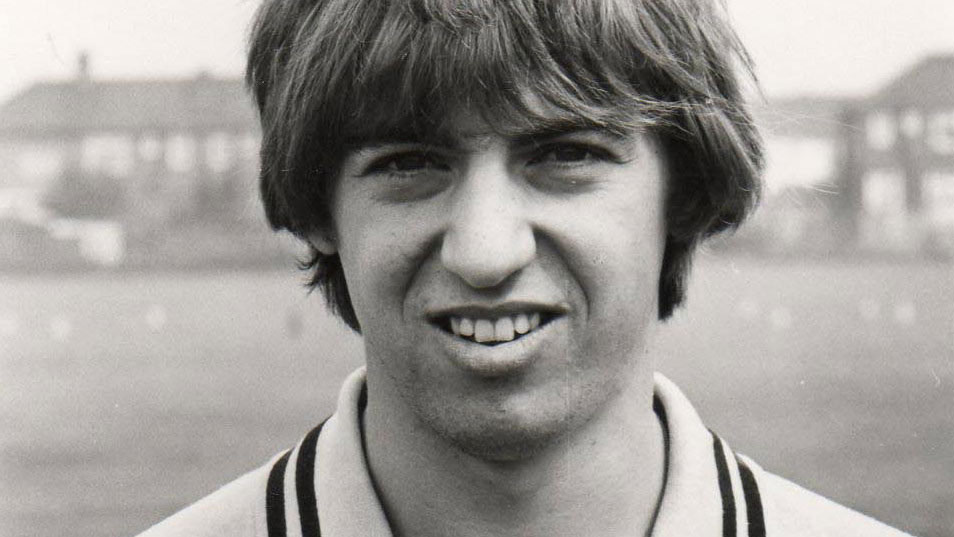
“Down the years, it’d been our opportunity to show we were knocking on the first-team door and, when you’re growing-up around Bobby Moore, Geoff Hurst and Ronnie Boyce, you learn very quickly.
“I can’t begin to describe how valuable their help was or even think how much it would’ve cost to pay for such advice,” continues Geoff. “We were being developed by the Football Club to play for the Football Club, whereas nowadays there’s a tendency for youngsters just to be sold-on.
“The philosophy has changed and today’s kids might never get anywhere near their first teams because time and patience are precious commodities that managers just don’t have anymore,” he observes. “It’s a results business so clubs will just buy the finished article rather than take a chance on lads in their youth ranks. That’s a real shame.
“We were very fortunate there was a culture at clubs like West Ham and Ipswich to nurture players and, when it came to that 1975 FA Youth Cup final, we had ‘Curbs’, ‘Brushy’, Alvin Martin and myself in our side, while they had Russell Osman, John Wark, Keith Bertschin and David Geddis. We all broke into our respective first teams.”
Wembley winner
While Lyall’s seniors overhauled Ipswich in the last-four on their way to their Wembley encounter with Fulham, the Claret and Blue colts had sadly fallen at the final hurdle with that 5-1 aggregate defeat to the outstanding, young Tractor Boys.
But just five years later, having now established themselves in the first-team squad, Pike, Martin and substitute Brush would lift the FA Cup in the shadows of the famous Twin Towers following a wonderful win over Arsenal.
“We always talk about that 1980 run,” smiles Geoff, who scored in our third-round replay victory over top-flight West Bromwich Albion (2-1). “And many of us reckon our name was on the cup from our very first tie, when we walked off at The Hawthorns having seen Phil Parkes put on a magnificent goalkeeping display to force a 1-1 draw against an Albion side who were absolutely flying.”
Pike is currently mentoring the likes of former Manchester United and Serbia centre-back Nemanja Vidić, while also helping other budding coaches to develop themselves across the globe.
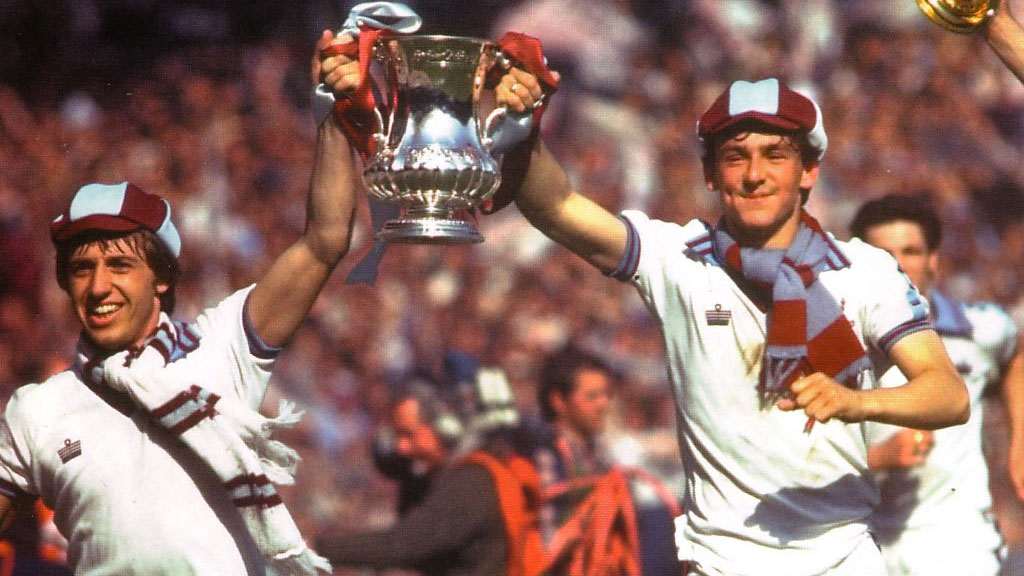
A fresh challenge
But closer to home, the brave, battling midfielder, who stands in 22nd-spot in the Club’s all-time appearance charts, faces a huge personal challenge of his own.
And it is something he wants to share with the entire West Ham United family.
“I was diagnosed with Parkinson’s disease about a year ago,” he confides. “That means I’m now under a specialist, taking medication and dealing with my situation as positively as possible.
“My wife, Pauline, has been so supportive and she’s helping me no end, while the local NHS team have been absolutely first-class, too.
“I’m one of the Club’s matchday ambassadors and love meeting Hammers fans and reliving the wonderful memories of some truly great times at West Ham United. Long may that continue – I certainly don’t want my illness to become a taboo subject with anyone.
“Parkinson’s has become the fastest growing neurological condition in the world and it’s important for people to be aware of it and understand what I’m going through right now.
“I’ve recently undertaken work in Saudi Arabia, Dubai and Thailand and, as well as coming to London Stadium for every game, my next task is to help set up a Pro-Licence-type education programme in Hong Kong,” concludes Geoff, typically full of courage, drive and positivity. “Don’t worry, I’m determined to carry on as normal, doing exactly what I’ve been doing…”
For more information about Parkinson's disease, please visit the NHS website HERE.
